Eagles are some of the largest and deadliest birds that soar through the skies. The 60 different species of these creatures live throughout the world, plucking unlucky fish and mammals from the water or off the ground. Yet, eagles aren’t the only thing lurking in the skies above. Owls are another highly effective avian hunter, but they’re more rarely seen because they stalk the air at night. Since they are both large predators, what are the differences between an eagle vs owl?
We’ll show you what separates these birds from one another, so you know how they look and some cool facts about each.
Comparing an Eagle and an Owl
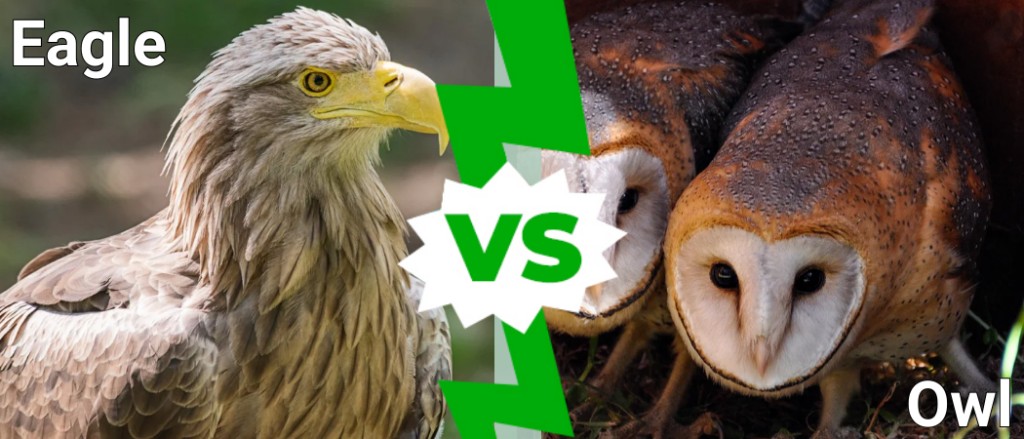
| Eagle | Owl | |
| Size | Weight: 1.1lbs-15.4lbs Height: 15.6in-39in | Weight: 1.5lbs-8.8lbs Height: 10in-30in |
| Wingspan | 50in-80in or more | 20in-72in |
| Active Time | Diurnal | – Nocturnal -Some species are diurnal |
| Beak Length | Long, sharp, and curved | Short, sharp, and curved |
| Lifespan | 15-35 years depending on the species | 5-12 years in the wild – 25 years in captivity |
| Feathers | Stiff and smooth feathers | Downy, soft feathers |
| Speed | The fastest eagles can reach 200 mph | – 40 mph |
The Key Differences Between Eagle vs Owl
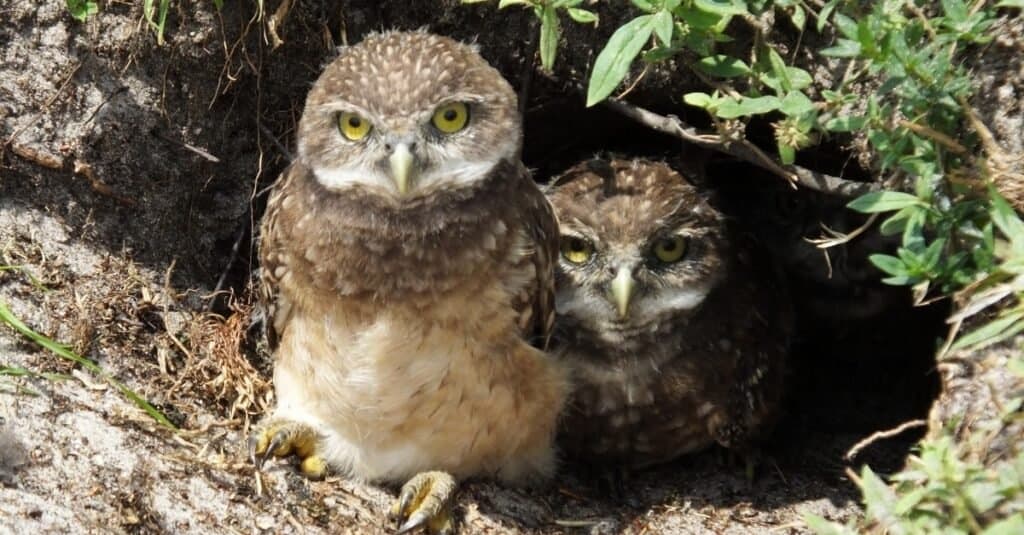
Eagles and owls differ in many ways including size, feather types, and weight.
©iStock.com/passion4nature
The biggest differences between eagles and owls include their size, wingspan, beak length, and feather type. On average, eagles are both taller and heavier than owls, with only a few species that weigh more than 10lbs.
Eagles have larger wingspans than owls in the majority of cases, and their beaks are longer, too. Lastly, their feathers are different types. Eagles have stiff and smooth feathers, while owls have downy feathers. These unique characteristics highlight the main differences between these birds, but we’ll go further in-depth for each of these elements in the following sections.
Eagle vs Owl: Size
Eagles are larger than the vast majority of owls. The largest eagles can weigh up to 15lbs or more, and they are large and strong enough to knock over a human being. Some of the tallest eagles grow up to 39 inches in height.
Most owls are much lighter, weighing between 1.5lbs and 8.8lbs. Some species can stand up to 30 inches in height. These are both very large birds, more than big enough to feast on the fish and small mammals that so often find themselves helpless in their talons.
Eagle vs Owl: Wingspan
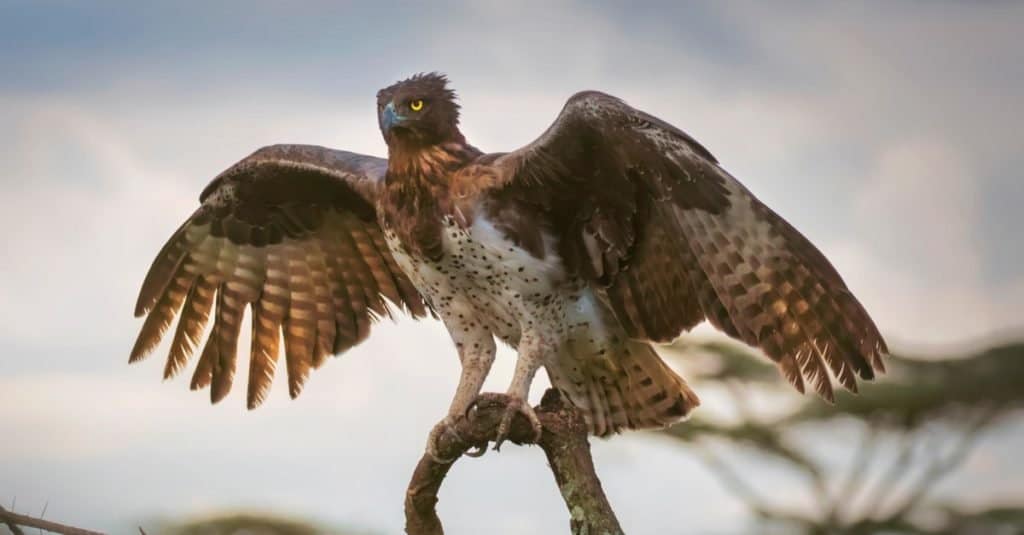
Martial eagles’ wingspan can exceed 90 inches
©Theodore Mattas/Shutterstock.com
Eagles have a larger wingspan than owls, but the difference is not that great. Eagles’ wingspans can reach lengths of 80in or longer in very rare cases like the Martial Eagle with an 8.5-foot wingspan. That shadow that bird casts on the ground would be frightening if their prey lived long enough to see it.
Owls also have a very big wingspan, with the largest of their species having wings that grow up to 72 inches in length. These animals might not be the largest birds in the sky, but they’re still very imposing.
Eagle vs Owl: Active Time
Eagles hunt during the day, and owls hunt during the night. One of the most well-known facts about owls is that they are nocturnal creatures that like to use the cover of darkness and their great senses to find a meal. Of course, that is not the case for every owl. For example, the northern pygmy owl and the northern hawk owl are both diurnal species, meaning they hunt during the day. Still, the majority of owls are nocturnal creatures.
Eagles are diurnal raptors, so they hunt for their prey during the daytime. With their incredible vision, they can spot prey from great distances and time their speedy swoops with the utmost precision. As a result of their preferred hours for hunting, interactions between owls and eagles are probably very rare.
Eagle vs Owl: Beak Length
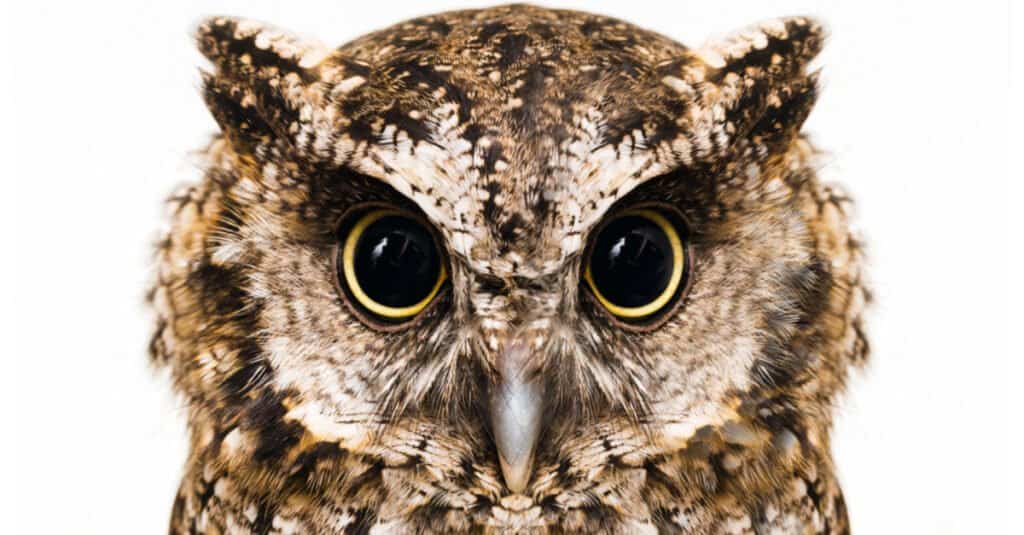
Owls have small, curved, downward-facing beaks.
©RHJPhtotoandilustration/Shutterstock.com
Eagles have longer and stronger beaks than owls. Many eagles’ beaks can grow over an inch long before taking a swift curve downward that facilitates tearing flesh and eating carrion. Owls have shorter beaks, but they are still very sharp and even more curved than an eagles’.
Eagles tend to hunt bigger prey than owls, so they need the beaks to rip through prey like fish and rodents.
Eagle vs Owl: Lifespan
Eagles live longer than owls in the wild and in captivity. Eagles survive and thrive in the world by rarely putting themselves in harm’s way. They dive in for the kill at blazing speed, not allowing their prey a moment to counterattack. Moreover, they’re often the biggest birds in the sky, so other airborne competition leaves them alone.
Owls have to deal with a shorter biological lifespan combined with slower flight speeds that put them at risk while hunting. These birds face threats from other animals that hunt them as well as starvation; they don’t have the highest rate of success while hunting, so their young may die before reaching maturity.
Eagle vs Owl: Feathers
Eagles’ feathers are stiff and smooth, and owls’ feathers are downy and soft. The eagles’ feathers are perfect for helping them stay aloft high in the sky while searching for prey. Owls’ feathers are soft, helping to reduce the amount of sound they make as they stalk and attack their prey.
Eagle vs Owl: Speed
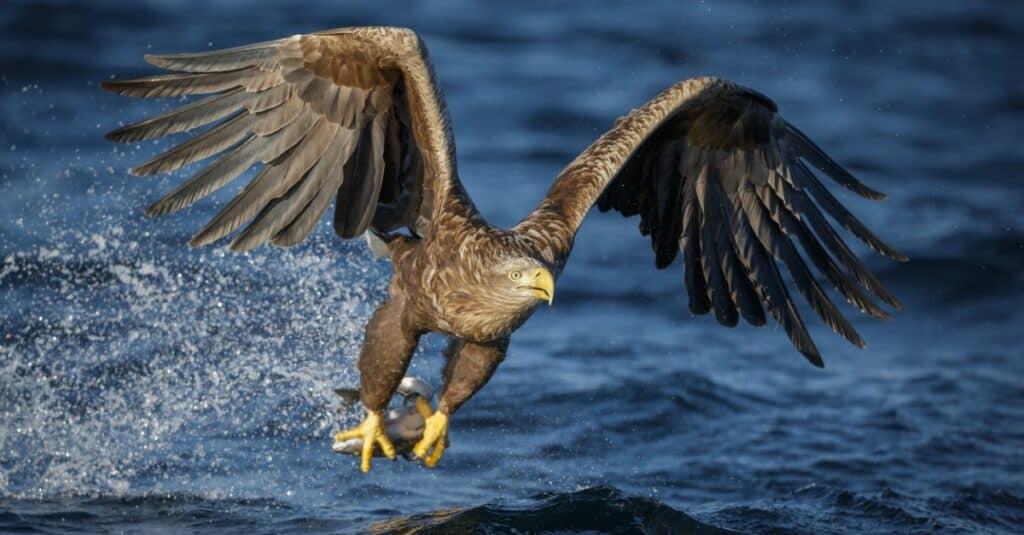
Eagles use their tremendous speed to grab prey before they can resist.
©iStock.com/Neil_Burton
Eagles are much faster than owls. The fastest eagles can reach incredible speeds as they dive, snatching their prey after zooming toward them at 200 mph. That speed is too fast for prey animals to react. Combined with the eagle’s weight and powerful legs and talons, they have been known to grab and pull goats from cliffs and then eat them after they crash to the earth.
Owls are still swift, reaching speeds of about 40 mph when they’re swooping in for a kill. The fact that their feathers are so soft lets them quietly sneak up on their prey.
Eagles and owls are both dangerous birds that will happily snatch up small mammals. Although these birds are very different in terms of size, speed, feathers, and more, the fact is they’re both similar in that they are noteworthy hunters.
Still, knowing the unique characteristics of both birds is helpful when one tries to tell them apart. However, the vast morphological differences that we barely touched on here along with their different waking hours ensure that most people can tell these birds apart at a glance.
The photo featured at the top of this post is © Alfredo Maiquez/Shutterstock.com
Thank you for reading! Have some feedback for us? Contact the AZ Animals editorial team.






